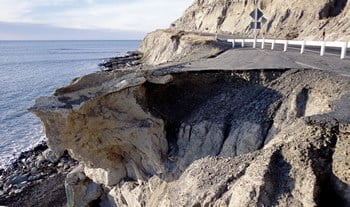Photo Above: From left – GNS Science Director James Johnston, Massey University Vice-Chancellor Steve Maharey, Science and Innovation Minister Steven Joyce, Assistant Vice-Chancellor Research at Massey University and Interim Governance Chair Brigid Heywood, and GNS Science Acting Chief Executive Kevin Faure at the launch of the Resilience Challenge in Wellington this week. Photo – Margaret Low, GNS Science.
The Resilience to Nature’s Challenges National Science Challenge was formally launched this week ushering in a collaborative and holistic approach to dealing with natural hazards in New Zealand.
It is the sixth of the government’s National Science Challenges to be launched and involves a consortium of 90 researchers from six universities, three Crown Research Institutes, and four private research organisations.
The Challenge has a ten-year lifespan and has been allocated funding of $19.6 million for its first four years.
Challenge Interim Director, Shane Cronin, said the Challenge represented a new partnership approach to managing natural hazards and risks in New Zealand.
Eighteen months of planning had gone into the creation of the Challenge and the development of its initial four-year work programme, Dr Cronin said.
“The Challenge has forged new working relationships and a new level of maturity in setting overarching goals and researcher priorities that go beyond an individual entity or an individual area of science.
“It will extend beyond defensive and adaptive approaches and will make New Zealand a safer place to live and a more attractive, lower risk investment opportunity.”
“Resilience in New Zealand is not short of thorny issues, but we feel we have assembled the best possible team to tackle some of these very hard questions that are fundamental to our future as a thriving nation,” Dr Cronin said.
Dr Cronin said the Challenge would also give birth to the next generation of researchers in natural hazards and risk reduction, with at least 20 post-graduate students being mentored through their PhD degrees between now and 2019.
“This will not only build new science, but new capacity to deliver it into New Zealand’s future.”
The Challenge represented an enlightened combination of the earth and physical sciences, engineering, social sciences, governance, economics and business and enterprise.
Its initial research focus involved specialist inputs from a large range of disciplines into four topic areas. This included working to improve the resilience of:
- New Zealand’s rural sector and its underpinning economy
- New Zealand’s rapidly growing urban areas, especially Auckland
- the specific cultural and economic resources and challenges faced by Maori
- areas facing extreme and sometimes unsustainable hazard threat, particularly along our coasts and rivers.

In this last area – known as the ‘edge programme’ – the Challenge would tackle big unknowns such as the compounding impacts of global climate change on New Zealand’s natural hazard profile.
“Resilience in New Zealand is not short of thorny issues, but we feel we have assembled the best possible team to tackle some of these very hard questions that are fundamental to our future as a thriving nation,” Dr Cronin said.
The Challenge is hosted by GNS Science in partnership with NIWA, Scion, The University of Auckland, Canterbury University, Otago University, Massey University, Lincoln University, Victoria University of Wellington, BRANZ, Opus International, Resilient Organisations Ltd, and Market Economics Ltd.
See our video introducing the Resilience to Nature’s Challenges below (2mins 20secs) and visit the Challenge website: https://resiliencechallenge.nz
See Science Minister Steven Joyce’s press release on the Resilience Challenge.

